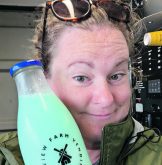There is one fundamental thing that needs to happen for a successful farm transition, says an expert in the field.
“It will require you, you as an individual, to change,” said Patti Durand, agriculture transition specialist with Farm Credit Canada.
And change isn’t easy.
She cited the example of a farm dad sitting in an FCC boardroom in rural Saskatchewan contemplating turning over the family business to his daughter.
He expressed hesitancy and anxiety about retiring from the business.
“I don’t know how to do anything else,” said the farm father. “I don’t want to do anything else. I don’t like golf.”
Read Also

Rural Manitoba resources slim on natural disaster planning
A study from Brandon University’s Rural Development Institute has found that many rural and small municipalities don’t have the staff or resources to make formal climate plans against natural disaster.
Durand said he was resisting the possibility that his life and purpose for living could change.
The need to change is not restricted to the senior partner in the farm venture. The junior partner needs to embrace it as well.
“Doing the same role you’ve always done won’t cut it,” she said in written remarks for a recent FCC webinar.
“It won’t get you there. In fact, it will prevent and stall transition.”
The key is that the junior partner needs to prepare to lead and the senior partner must prepare to exit the business.
“Notice the emphasis is on preparation. We aren’t looking for you to lead or leave today but what might you do to get ready for that eventuality,” said Durand.
The first thing the senior partner needs to do is start thinking about what they will do post-retirement.
“I don’t like to golf” is not an acceptable excuse for failing to come up with a to-do list.
“Try things. Explore. Ask others. Experiment. Read. Seek coaching,” she said.
Durand stressed that the senior partner doesn’t necessarily have to completely leave the farm but rather shift their role to become a mentor and labourer.
Sometimes, however, it may be best to remove yourself completely from the operation.
The next step for the senior partner is coming up with a budget of how much cash they will need from the farm each year for the remainder of their life. There are cost of living calculators to help with that process.
For the junior partner, a good place to start is with a self-evaluation, identifying their farm business skills and areas that need to be developed.
Durand recalls a conversation with one young farmer who thought he knew all he needed to know because he could operate every piece of equipment except for the sprayer.
“He genuinely felt that his skill set was complete based on equipment operation,” she said.
“I don’t believe he was being cocky either. He just didn’t know how many farm tasks he was unaware of and had failed to dig deeper.”
The next step is to establish a transition timeline. Durand often hears crickets when she asks the senior partner when they want to retire. But many do have a timeline for when they want to stop being the lead decision maker.
FCC has developed a roles and responsibilities assessment document that identifies who is doing what now, what needs to change over time and when and how it will happen.
Durand said farms should start planning for transition five to 10 years ahead of time. The longer the runway, the better.
“I have yet to see someone who started transition planning too early,” she said in the question-and-answer session.
She also encouraged the senior partner to consider sharing details of their will with their children.
“There is a longstanding history of keeping wills secret,” said Durand.
That can result in a horror story in the lawyer’s office when the will is revealed and everybody is shocked.
She encouraged parents to ask their heirs what they expect and if there is any particular item of interest to them.
Durand stressed that they are not giving authority to their heirs but just gathering input.
This provides the opportunity to address unreasonable expectations, to give heirs some idea about the complexities of creating a will and to enhance their understanding of why certain decisions were made.
“While you’re on the right side of the grass you can still explain your intentions,” she said.
She knows of one farmer who pulls out his will every New Year’s Day.
“He sets it in front of all his farming and non-farming children and says, ‘OK, we’re going to have a look at it again. Any questions? Any concerns?’” said Durand.
“Now that’s transparency.”















